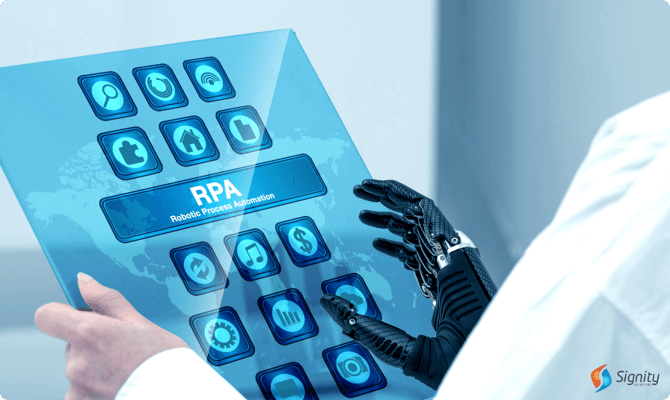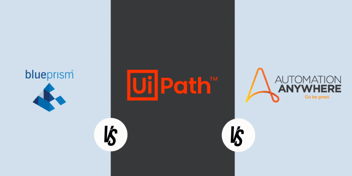Top 7 Open Source RPA Tools: Which One To Choose in 2023
This blog outlines the top seven open-source RPA tools impacting 2023. Here you’ll learn about each tool feature used in RPA and the criteria to find the best RPA development partner that helps you achieve optimum ROI.

“Robotic process automation tools are software applications that allow users to create software bots that interact with systems the same way humans do but faster and more consistently. “
Open-source RPA is a type of Robotics Process Automation software that is available for free and can be modified by users. This clearly means that anyone can download and use the software and contribute to its development by adding new features or fixing bugs.
There’s no doubt open source RPA tools let organizations maximize the automation value.
Here are a few open-source RPA benefits for businesses, including:
-
Free
Open-source RPA tools are free to download and use, saving businesses a huge amount of money.
-
Community
A big community of developers contribute to open-source RPA tools, which means enormous support is available.
-
Flexibility
Open-source tools are flexible and easily customized to cater to your business's unique needs.
However, there are some challenges associated with open-source RPA. They are:
-
Security
Open-source RPA tools may not be as secure as commercial RPA tools, as they are not on the same page of testing and auditing.
-
Support
There may be less support available for open-source RPA tools than commercial RPA tools.
-
Complexity
Open-source RPA tools can be complicated to use, especially for those who come from a non-tech background.
On the whole, open-source RPA tools can be a prized tool for businesses searching for a cost-effective and flexible way to automate tasks. However, before picking an open-source RPA tool, it’s important to consider the challenges associated with the tool.
Here are Some Most Popular Open Source RPA Tools:
-
Open RPA
Open RPA is a mature open-source RPA framework that is easy to use and has a huge developer community. It is a mature framework that has been in the market for many years and is constantly being updated with new features.
Some of the features of Open RPA include:
- Easy to use: Open RPA is crafted to be easy to use, even for those who are new to coding. The framework uses a drag-and-drop interface, and there are a number of pre-built activities that can be put to use to automate tasks.
- Flexible: Open RPA is flexible and can be used to automate several tasks. The framework supports various input and output formats and can interact with multiple applications and systems.
- Scalable: Open RPA is easy to scale and can be used to automate tasks in big organizations. The framework supports a distributed architecture, and it can be set up on a variety of platforms.
- Safe: Open RPA is secure and can be used to automate tasks that need access to sensitive data. This framework supports various security features, such as encryption and access control.
UiPath
UiPath is a reliable and trusted RPA tool for large-scale end-to-end automation. UiPath offers different editions of the same RPA tools supporting other needs. The best part of its offering is it has an active community that is proactive in solving all kinds of concerns.
Some of the features of UiPath Open Source include:
- Drag-and-drop interface: UiPath Open Source uses a drag-and-drop interface, making creating and deploying automation hassle-free.
- Pre-built activities: UiPath Open Source includes several pre-built activities that can be used to automate common tasks.
- Extensibility: UiPath Open Source is extensible, meaning users can create their own custom activities.
- Community: A big community of UiPath users contribute to the development of the platform.
If you want to implement UiPath for your business, you can hire a UiPath developer to help you customize UiPath for your business and ensure a smooth implementation.
AutomationAnywhere
AutomationAnywhere is one of the globally recognized RPA tools in the market. It has created a place for its dynamic and user-friendly interface, automating complex business tasks by employing software bots.
It combines traditional and intelligent RPA elements like NLP (Natural Language Processing), Machine Learning, and reading unstructured data.
Some of the features of AutomationAnywhere include:
- Auto-Calibration Technology: The Auto-Calibration technology helps AutomationAnywhere to stay agile and change according to the situation.
- Integrated AI-Capabilities: The embedded AI capabilities in the tool empower bots created using AA to perform tasks mimicking human intelligence and proficiency.
- Analytics and Cognitive Capabilities: AutomationAnywhere is the only probable tool with analytic and cognitive abilities licensing it to work seamlessly with unstructured and semi-structured data.
- Supports Data Extraction: Data extraction and running classification algorithms are possible due to the machine learning capabilities of these artificial intelligence tools.
BluePrism
BluePrism is a process automation tool for intelligent enterprise automation. It can process assessment, automated decisions, intelligent orchestration and task mining. All in all, it’s a powerful tool to automate numerous tasks across a variety of industries.
Some of the key features of Blue Prism include:
- Easy-to-use drag-and-drop interface: Blue Prism uses a drag-and-drop interface that makes creating and deploying automation easy. This makes it a good choice for businesses that do not have a lot of experience with RPA.
- Extensibility: Blue Prism is extensible, which means that businesses can create their own custom activities. This allows businesses to automate tasks that are not already supported by the pre-built activities.
- Reporting: Blue Prism provides reporting features that allow businesses to keep track of the performance of their automation. Automating their processes helps businesses see how much time and money is saved.
- Security: Blue Prism is secure and can be used to automate tasks that need access to crucial data. Also, the platform supports a variety of security features, like encryption and access control.
Robocorp
Robocorp open source Gen2 RPA is developed for developers and teams that want to work smart and not hard. It’s a powerful, versatile, open-source RPA platform based on Python.
Some of the key features of Robocorp include:
- Python-based: Robocorp is based on Python, which is a popular and powerful programming language. This makes it easy for developers to create and deploy automation.
- Secure: Robocorp is secure and is used to automate tasks requiring sensitive data access. The platform supports several security features, like encryption and access control.
- Community: A large community of Robocop users contribute to the development of the platform. This clearly means that a lot of support is available for businesses that pick Robocorp for use.
Kofax
Kofax RPA is a powerful and versatile tool that is used to extend workforce capacity, minimize system disruption, and speed up workflows. This platform is easy to use and can be deployed quickly.
Here are some of the features of Kofax RPA:
- Extensibility: Kofax RPA is extensible, which means that businesses can create their own custom activities. This allows businesses to automate tasks that are not already supported by the pre-built activities.
- Reporting: Kofax RPA provides reporting features that allow businesses to track the performance of their automation. Automating their processes allows businesses to see how much time and money they save.
- Safe: Kofax RPA is safe and can be used to automate tasks that need access to crucial data. The suite supports a variety of security features, such as encryption and access control.
Liberty RPA - (Formerly known as Automagica)
Liberty RPA by Netcall is a popular AI-powered RPA tool that frees people from monotonous and voluminous tasks like filing forms, extracting data from multiple files and folders, creating daily reports, and many more.
Some of the key features of Liberty RPA include:
- Easy to use: Liberty RPA is built to be hassle-free, even for those who are not familiar with RPA. The drag-and-drop interface makes it easy to develop automation, and a large library of pre-built activities can be used to automate common tasks.
- Scalable: Liberty RPA is designed to be scalable and can be used to automate tasks in large organizations. The platform is able to manage voluminous bots and tasks, and it can be deployed on-premises or in the cloud.
Finally
There is a huge potential in Open Source RPA. Although, the inescapable part of these tools is that they can create an open framework for users to blend with other tools to innovate.
And, as part of modernizing technology, everyone should adopt these open-source RPA tools in automating conventional business processes.
Frequently Asked Questions
Have a question in mind? We are here to answer.
How do I choose the right open-source RPA tool for my business?
![]()
There are numerous elements to consider while choosing an open-source RPA tool for your business, including:
- The size and complexity of your business: If your business is large or complex, you will need an open-source RPA tool that is scalable and can handle many bots and tasks.
- The type of tasks you want to automate: Some open-source RPA tools are better suited for certain types of tasks than others. For example, some tools are better at automating web-based tasks, while others are better at automating desktop-based tasks.
- Budget: Open-source RPA tools are typically free to use, but some costs may be associated with deployment and maintenance.
- Your technical expertise: If you are not familiar with RPA or programming, you will need to choose an open-source RPA tool that is easy to use.
What are the benefits of using open-source RPA tools?
![]()
There are many benefits to using open-source RPA tools, including:
- Cost-effectiveness: Often, Open-source RPA tools are free to use, saving businesses significant money.
- Flexibility: Open-source RPA tools are flexible and can be customized to meet the specific needs of businesses.
- Community: A large community of open-source RPA users contribute to the development of the tools. This means that a lot of support is available for businesses that use open-source RPA tools.
- Security: Open-source RPA tools can be secure, as they are often developed with security in mind. However, it is important to carefully evaluate the security features of any open-source RPA tool before using it.



.png?width=344&height=101&name=Mask%20group%20(5).png)















